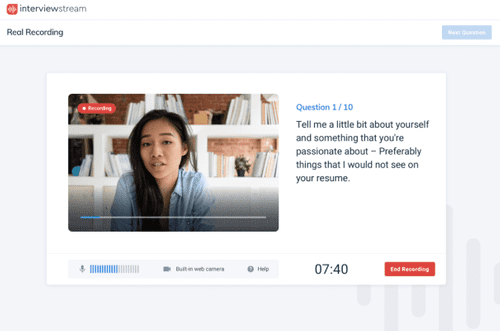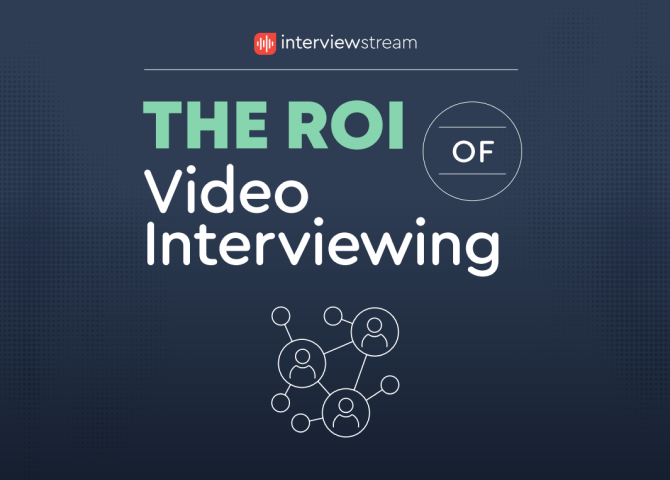The Comprehensive Guide to Video Interviewing (for Recruiters)

The rundown
- Conducting virtual interviews can give you a leg up in reaching more candidates and shortening your screening timelines.
- Launch your video interviews with best practices in mind to deliver a tailored experience for candidates and make the best first impression.
- The software you use for hosting video interviews matters — a purpose-built tool makes your job easier when taking your candidates from application to screening to hiring.
Table of contents
- Why You Should Care About Video Interviewing
- Two Basic Categories of Video Interview: One-way and Live
- How Video Interviews Benefit Employers
- How Video Interviews Benefit Candidates
- Best Practices for Video Interviewing
- What You Need From a Video Interview Tool
- About interviewstream
Why You Should Care About Video Interviewing
When you’re trying to fill an open role in your organization, two factors in your recruiting strategy are essential to your success: time-to-hire and candidate experience. Video interviewing helps you shorten the time to onboard a new employee and improves candidate experience by streamlining the hiring process. On the hiring side, these platforms save your company time, money, and stress by simplifying your recruitment strategy.Video interviews benefit both the interviewer and the interviewee. They give your candidates a more tailored and flexible experience and reduce your recruiting spend. Swap screening calls for one-way on demand candidate videos, and trade your expensive in-person interviews for two-way connect video interviews. Video interviews transform and modernize your hiring process—and the platforms are ridiculously user-friendly.Additionally, the geographic reach of video interviewing widens your applicant pool and makes it easier to connect with candidates from all over—without the scheduling hassles and expense of offering travel and accommodations to far-flung prospects.Put simply, your competitors in the job market are already conducting video interviews. If you’re not offering this option to prospective employees, you could be losing out on valuable talent.
Interested in our HR newsletter? Sign up below!
Sign up for our newsletter – we send out an email every 6 weeks which includes HR trends, industry-relevant knowledge, and the latest interviewing tips for recruiters and candidates.
Two Basic Categories of Video Interview: One-way and Live
During the hiring process, recruiters can leverage two main types of video interviews: one-way recorded video screenings, and two-way live interviews.
One-Way Video Interviews
One way video interviews replace the phone screening stage of the recruiting process. After a candidate applies for a role, recruiters send them a prompt to complete a one-way interview by a set deadline.

When a candidate follows that prompt, it will take them to an online tool pre-loaded with a handful of interview questions set by the recruiter or hiring manager. The applicant will then be able to kick off a recording process, during which they’ll create brief videos of themselves answering each question within an allotted amount of time.Once they’ve completed the entire interview, they submit their recordings. The hiring team will be able to see completed videos on their end of the system. They can watch the videos, rate candidates, and share feedback to help determine which applicant should move forward in the process.
Live Video Interviews
As an online, remote option to replace formal in-person interviews, live video interviews are two-way conferences between interviewers and interviewees. Just as they would in person, the group converses in real time and can get to know each other face to face.

Although some teams may choose to conduct these interviews over basic video conferencing tools such as Zoom or Skype, purpose-built interviewing software is more amenable to the process. For example, these tools offer branding options to aid in making a professional and positive impression, can often be used without having to download any local software so it’s easier for interviewees to join a conversation, and provide interviewers with access to predetermined questions in an unobtrusive way.
How Video Interviews Benefit Employers
Key benefits to video interviews for hiring teams include:
- Simplified scheduling. Avoid filling your recruiters’ calendars with dozens of phone screenings so they can spend more time sourcing applicants and learning what hiring managers need. Instead of trying to book interviews based on when candidates can travel to you, you’ll have more opportunities to connect remotely.
- Recorded for reference. Rather than having recruiters convey their first impressions of a screening call to hiring managers, or requiring interviewers to share their takeaways on a candidate from memory alone, video interviews allow you to share recordings of these conversations. This is a great benefit for training purposes — record training videos to save your managers’ time and provide a go-at-your-own-pace training for new employees.
- Improved collaboration. Centralizing all of your recruiting information—recorded interviews, applicant profiles, documentation of the team’s feedback, interview questions, and more—into a single repository can ensure your entire hiring team has access to the same, accurate information at all times.
- Shorter time to hire. Easier scheduling and more direct lines of communication mean you can screen candidates quickly — which means you find the best talent in less time. A largely digital hiring process cuts down on the time it takes to go from job posting to job filling, so you’ll minimize talent gaps in your organization.
How Video Interviews Benefit Candidates
Candidates also enjoy some important advantages from video interviewing:
- Minimize middlemen. Candidates want to communicate with someone who works at the company and knows their position. Video interviews provide the opportunity to directly connect with someone in the company, rather than relying on the word of an outside recruiter. Even one-way interviews will likely be seen by an actual employee.
- Smaller time commitments. Many candidates speak with more than one company while job hunting or are juggling their job search with their current role. The simplified scheduling, reduced travel time, and ability to record responses on their time ensure they can explore a new job opportunity without spending excess time on the process.
- Greater flexibility. Video interviews help candidates record one-way interviews outside of office hours, schedule an interview for any time, and feel more consistently seen and understood by a hiring team. This offers greater flexibility and ownership of the recruiting process. In addition, it shows your candidates that your team respects their time and autonomy from the very start.
- More authentic representation. Video screenings and interviews help candidates present themselves in a more genuine, human way from the earliest phases of the recruiting process. With these tools, they can ensure your hiring team sees them for who they are—not just what’s on their resume.
A Recruiter’s Best Practices for Video Interviewing
When you begin offering video interviews to your job candidates, keep in mind that it won’t be a direct transition from your in-person recruitment process. To start with, let’s cover some basics to ensure your strategy is on point.
- Always be testing. You’ll want to get familiar with your interview tool and play around with it quite a bit before going live. This will ensure a professional, smooth impression on candidates—and minimize the risk of error on your end. Conduct mock applications and interviews amongst your team before you launch to help everyone get familiar with the process from every angle.
- Prepare questions in advance — and don’t assume they’ll be the same as your phone or in-person questions. Make sure you have a reliable library of insightful questions for conducting video interviews. Your chosen tool should provide some, but feel free to customize it to suit your needs and culture. For example, one-way screenings remove the opportunity for follow-up questions, so make sure you’re designing questions to generate meaningful insights right off the bat.
- Train your interviewers responsibly. Make sure all the team members who will participate in video interviews are prepared to approach it as professionally and thoughtfully as they would an in-person interview. That means dressing well, choosing good backgrounds, pausing to allow others space to speak, and appearing friendly and approachable—as well as completing technical training on the interview tool itself.
- Provide candidates with detailed instructions. Although many candidates are likely familiar with video interviews and conferences, there are a ton of different tools out there and every company uses them a little differently. In your interview invitations, share detailed information about how they should access the meeting, what to expect from the process, and how to avoid tech malfunctions. And, check your own tech so it doesn’t intervene with your allotted time for meaningful conversation.
What You Need From a Video Interview Tool
While you may use Zoom, Skype, or Microsoft Teams to conduct video meetings amongst your team, these aren’t the best choices for video interviewing software. This is because those tools foster excellent collaboration amongst colleagues, but don’t provide the seamless experience your recruiters and candidates need in the hiring process.Instead, look into purpose-built interviewing software that can offer end-to-end support for your hiring team. Such modern tools include features like:
- Integration with HR and job posting systems to ensure the accuracy and connectivity of your candidate profiles, job postings, and, ultimately, employee data.
- Scheduling tools that allow both recruiters and candidates to find mutual calendar openings and set reliable meeting times.
- A library of interview questions, with the option to customize existing questions or add your own to support a consistent, insightful, and appropriate interview experience.
- The ability to put your branding on the interview interface for a more professional and tailored look and feel.
- Customizable guides for interviewer feedback on candidates, which ensure fair and consistent ratings on each applicant.
- Recordings of interviews, and applicant profiles that can be shared with permission across hiring teams.
- Safe and secure data storage to ensure the privacy of candidates’ information is well protected against digital threats.
- Thorough documentation and accessible, friendly support teams who can help you implement best practices, troubleshoot any issues, and educate your team on how to best use the software.
Look for all of these capabilities when selecting a video interviewing platform. Your team will see the benefits in saved time, cost, and hassle over the long term; and your candidates will get the best possible version of you at every recruiting touchpoint.
Want to learn more about video interviewing?
Chat with a client success expert today and learn how to leverage remote interviewing solutions to simplify and personalize your hiring practices.
About interviewstream
interviewstream is an industry leading recruiting software company that helps you reach your top candidates more effectively. Our customers have completed over 3 million interviews using interview builder, interview on demand, interview scheduler, interview connect – and we’d love to help you as well. Talk to an expert today to learn how to get started.
Want a PDF version of this eBook?
Submit your email and we’ll send the eBook straight to your inbox.
The interviewstream platform
Speak to an expert today to learn how our remote interviewing solutions make hiring more effective.
About interviewstream
As companies transition to remote work, we exists to help recruiters and hiring teams ask the right questions every time, screen candidates faster, make scheduling easier and reach candidates everywhere. Using our remote interviewing platform, your team will have a complete view of the candidate in one location while also leveraging one of the leading platforms for online interviewing.
Table of contents



